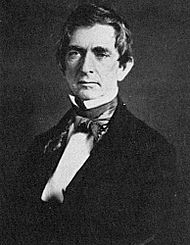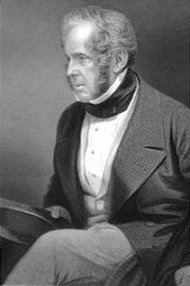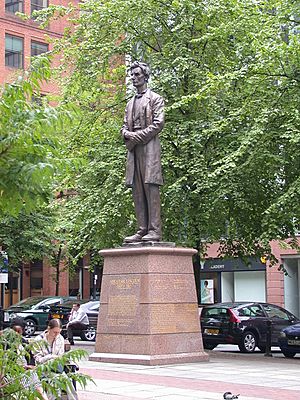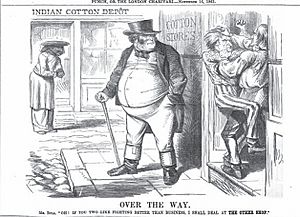United Kingdom and the American Civil War facts for kids
The United Kingdom stayed officially neutral during the American Civil War (1861–1865). It saw the Confederate States of America (CSA) as a fighting group but never as a real country. Britain didn't sign treaties with them or exchange ambassadors. Over 90% of the Confederacy's trade with Britain stopped, leading to a big shortage of cotton by 1862.
Some British ships, called blockade runners, secretly brought weapons and fancy goods to Confederate ports. In return, they took cotton and tobacco. In Manchester, the lack of American cotton caused a huge economic problem known as the Lancashire Cotton Famine. Even with many people out of work, some Manchester cotton workers refused to use cotton from America because they were against slavery. President Lincoln praised them for this, and a statue of him in Manchester has a plaque with his words of thanks for their help in "helping abolish slavery."
Top British officials thought about helping to make peace in the first 18 months of the war. The Confederacy wanted this, but the United States strongly said no. People in Britain had different opinions about the war. Richer people often supported the Confederacy, while middle and working-class people mostly supported the Union. A lot of trade continued between Britain and the whole US. The US sent grain to Britain, and Britain sent manufactured goods and weapons to the US. Many Britons also moved to the US and joined its army.
The Confederacy hoped that Britain and France would step in militarily to help them become independent. A serious argument happened in late 1861, called the "Trent Affair," but it was solved peacefully after five weeks. By early 1863, Britain was no longer seriously thinking about getting involved in the war.
A big problem was British shipyards selling warships to the Confederacy. A British company built two warships for the Confederacy, including the CSS Alabama. The US protested strongly. This issue, known as the Alabama Claims, was settled peacefully after the war. An international group decided that the US should get $15.5 million for the damage caused by these warships.
British private companies running blockade runners didn't cause major problems. In the end, Britain's involvement didn't really change the outcome of the war. The US team of diplomats, led by Charles Francis Adams Sr., was much more successful than the Confederate teams, which Britain never officially recognized.
Contents
Confederate Goals
The Confederacy, led by President Jefferson Davis, believed in "King Cotton." This was the idea that Britain needed cotton so much for its large textile industry that it would officially recognize the Confederacy and help them. The Confederates didn't check beforehand if this "King Cotton" plan would work. Instead, people stopped sending cotton to Europe in spring 1861, not because the government ordered it.
When Confederate diplomats arrived in Britain, they tried to say that the US naval blockade was illegal. Historian Charles Hubbard wrote that President Davis expected things to happen on their own rather than actively working on foreign policy. Davis believed cotton would make Europe recognize the Confederacy. He chose his foreign policy leaders for political reasons, not because they were good at diplomacy. This was partly because he thought cotton would do most of the work for them.
Hubbard also said that Davis's policy was stubborn. European countries didn't like the "King Cotton" strategy. Some Confederate leaders, like Judah P. Benjamin and Christopher Memminger, warned that cotton should be sent out quickly to earn money from other countries.
Union Goals

The Union's main goal in foreign affairs was to stay friends and keep trading a lot with the world. They especially wanted to stop any country, particularly Britain, from officially recognizing the Confederacy. Other goals included stopping the Confederacy from buying foreign warships and getting European support against slavery. They also wanted to attract immigrants to work on farms and join the army.
Relations between Britain and the US had been getting better throughout the 1850s. Problems over borders and land had been solved, and trade was busy. William H. Seward, the US Secretary of State, guided American foreign policy during the war. He wanted to stick to the old rules that had worked since the American Revolution: the US wouldn't get involved in other countries' business, and it would resist other countries getting involved in the US or other parts of the Americas.
British Decisions

British public opinion was split on the American Civil War. Richer people, like the aristocracy and landowners, often supported the Confederacy. They felt a connection with the Southern plantation owners. Some church leaders and professionals who liked old traditions and a system where leaders looked after people also supported the South.
However, the middle classes, religious groups not part of the main church, thinkers, reformers, and most factory workers favored the Union. They saw slavery as wrong and a threat to working people. Still, many Britons didn't express a strong opinion.
In the British government, William Ewart Gladstone, who managed the country's money, supported the Confederacy. His family had made money from slavery in the Caribbean before it was abolished in 1833. Foreign Minister Lord Russell wanted Britain to stay neutral. Prime Minister Lord Palmerston was unsure. He believed in countries being independent but also opposed slavery. He also saw the strong economic benefits of Britain staying neutral.
Even before the war began, Lord Palmerston decided on a policy of neutrality. His main concerns were in Europe, where he watched Napoleon III's plans and Otto von Bismarck's rise in Prussia. There were also big issues with Italy, Poland, Russia, Denmark, and China. Britain's reactions to American events were shaped by its past policies and its own interests, both for safety and money.
In the Americas, as relations with the US improved, Britain became careful about arguing with them over Central America. As a powerful navy, Britain had always insisted that neutral countries follow its blockades. This view led Britain to support the Union blockade from the start of the war, which frustrated the South.
Other countries' diplomats were suspicious of Britain's reasons. The Russian Minister in Washington, Eduard de Stoeckl, said, "The Cabinet of London is watching attentively the internal disagreements of the Union and waits for the result with an impatience which it has difficulty in hiding." He thought Britain would recognize the Confederacy as soon as it could. Cassius Clay, the US Minister in Russia, said, "I saw right away how England felt. They hoped for our ruin! They are jealous of our power. They care nothing for the South or the North. They hate both."
Lincoln chose Charles Francis Adams Sr. to be the US minister to Britain. A key part of his job was to make it clear to the British that the war was an internal uprising. This meant the Confederacy had no special rights under international law. Any move by Britain to officially recognize the Confederacy would be seen as an unfriendly act towards the US. Seward told Adams to remind Britain that a country with many scattered colonies, like the British Empire, should be very careful about "setting a dangerous example" by supporting a rebellion.
Lord Lyons became the British minister to the US in April 1859. He had a lot of diplomatic experience. Like many British leaders, Lyons had doubts about Seward and shared them in his letters, which were read widely in the British government. As early as January 7, 1861, before Lincoln even took office, Lyons wrote to Lord Russell about Seward:
I cannot help fearing that he will be a dangerous foreign minister. His view of the relations between the United States and Britain had always been that they are a good material to make political capital of.... I do not think Mr. Seward would contemplate actually going to war with us, but he would be well disposed to play the old game of seeking popularity here by displaying violence toward us.
Despite not trusting Seward, Lyons kept a "calm and careful" approach throughout 1861. This helped solve the Trent crisis peacefully.
Slavery and Trade
The Confederate States formed after seven of the fifteen slave states left the Union. This happened because Republican President Lincoln was elected. His party wanted to stop slavery from spreading and weaken the political power of slave owners. Slavery was the foundation of the South's plantation economy. However, most people in Britain found slavery morally wrong, as Britain had abolished it in its Empire in 1833.
Until late 1862, ending slavery immediately was not a main goal of the war. In fact, some Union states still allowed slavery. In 1861, Missouri tried to get an escaped slave from Canada to face trial for murder. Some in Britain wrongly believed he would be executed for this.
Lincoln's Emancipation Proclamation, announced in September 1862, made ending slavery a goal of the war. This made it unpopular for European countries to intervene on the South's side. However, some British leaders thought it would cause a big race war that might need foreign help. Gladstone started a government discussion about whether Britain should step in. He stressed helping people to stop the huge number of deaths, the risk of a race war, and the Union's failure to win battles. In the end, the government decided that the American situation was less urgent than stopping Russia from expanding, so they chose not to intervene.
During the Civil War, several British arms companies and financial firms worked with Confederate agents in Europe. They supplied the Confederacy with much-needed weapons and military goods throughout most of the war, in exchange for Southern cotton. Companies like Trenholm, Fraser & Company also provided money for British shipyards that built blockade runners. These ships were used to get past the Union blockade to bring in cotton, which British textile factories relied heavily on. British companies like Sinclair, Hamilton and Company, S. Isaac, Campbell & Company, and London Armoury Company were the main suppliers of weapons and military supplies. They often gave credit to Confederate agents for these purchases.
The Trent Affair
An actual war almost happened in late 1861. The US Navy stopped a British mail ship and captured two Confederate diplomats. Confederate President Jefferson Davis had named James Murray Mason and John Slidell to represent Confederate interests in England and France. They traveled to Havana, in Spanish Cuba, and then boarded the British mail steamer RMS Trent to go to England. The American warship USS San Jacinto, led by Captain Charles Wilkes, was looking for them.
It was generally agreed back then that a country at war could stop and search a neutral merchant ship if it thought the ship was carrying enemy messages. Wilkes believed Mason and Slidell were like Confederate messages, so he had the right to take them. On November 8, 1861, he fired two shots across the Trent's bow, sent a crew aboard, seized the Confederate diplomats, and took them as prisoners to the US. Wilkes was celebrated as a national hero.
This violation of British neutral rights caused a huge outcry in Britain. Britain sent 11,000 troops to Canada, and its navy prepared for war, with plans to blockade New York City if war broke out. Also, the British stopped exporting saltpetre, which the US needed to make gunpowder. About 90% of the world's natural saltpetre was in British territory, and the US was buying as much as it could. Britain sent a strong message to Washington demanding the prisoners be returned and an apology. Lincoln, worried about Britain joining the war, ignored anti-British feelings. He issued what Britain saw as an apology, without actually saying sorry, and ordered the prisoners to be released.
War was unlikely anyway. The United States was not only importing saltpetre from Britain but also providing Britain with over 40% of its wheat imports during the war years. Stopping this would have caused a severe food shortage in Britain. Britain imported about 25–30% of its grain, and bad harvests in France in 1861 and 1862 made Britain even more dependent on shipments from New York City. Also, British banks and financial companies in the City of London had invested in many US projects, like railways. There were fears that war would lead to huge financial losses as investments were lost and loans were not repaid.
Britain's cotton shortage was partly solved by imports from India and Egypt by 1863. The Trent Affair led to the Lyons-Seward Treaty of 1862. This agreement aimed to crack down hard on the Atlantic slave trade using both the US Navy and the Royal Navy.
Could Britain Recognize the Confederacy?
The idea of recognizing the Confederacy became a big topic in late summer 1862. At that time, it looked to Europeans like the war was stuck. The US attempt to capture the Confederate capital had failed, and both in the east and west, the Confederates were attacking. Charles Francis Adams Sr. warned Washington that the British government might soon offer to mediate the conflict between North and South. This would be a polite way of saying that Britain thought the fight had gone on long enough and should end by giving the South what it wanted. Adams warned that recognition risked a full-blown war with the United States. Such a war would mean an invasion of Canada, a big American attack on British ships worldwide, an end to American grain shipments (which provided much of Britain's food), and an end to British sales of machinery and supplies to the US. However, British leaders thought that if the Union armies were clearly defeated, the US might change its mind and accept mediation.
Earl Russell, the British Foreign Secretary, had not encouraged Mason. But after news of the Second Battle of Bull Run reached London in early September, Palmerston agreed that a government meeting could happen in late September. At this meeting, Palmerston and Russell would ask for approval of the mediation plan. Then, Russell and Palmerston decided not to bring the plan to the government until they heard more about Lee's invasion of the North. If the Northerners were defeated, the plan would go ahead. If Lee failed, it might be better to wait longer before doing anything.
The British working class, especially the cotton workers who suffered during the Lancashire Cotton Famine, consistently opposed the Confederacy. The people of Manchester passed a resolution of support and sent it to Lincoln. His reply became famous:

I know and deeply regret the suffering which the working people of Manchester and in all Europe are called to endure in this crisis. It has been often and carefully said that the attempt to overthrow this Government, which was built on human rights, and to replace it with one based only on slavery, was likely to gain Europe's favor.
Because of disloyal citizens, the working people of Europe have faced a severe test to force them to approve that attempt. Under these circumstances, I can only see your strong statements on the issue as an example of amazing Christian heroism that has not been surpassed in any age or country. It is truly a strong and inspiring assurance of the natural truth and of the final and worldwide victory of justice, humanity, and freedom.
I welcome this exchange of feelings, therefore, as a sign that, whatever else may happen, whatever misfortune may come to your country or my own, the peace and friendship that now exists between the two nations will be, as I wish to make them, forever.—Abraham Lincoln, January 19, 1863
There is now a statue of Lincoln in Manchester, with a part of his letter carved on its base.
Lincoln became a hero among the British working class who had progressive views. His picture, often next to that of Giuseppe Garibaldi, decorated many living room walls. One can still be seen in the childhood home of David Lloyd George, now part of the Lloyd George Museum.
The key event in late 1862, and increasingly afterward, was the Battle of Antietam and what followed. Lee's invasion failed at Antietam, and he barely escaped back to Virginia. It was now clear that a final, decisive Confederate victory could not be expected. The quick retreat of the Confederate advance was as clear in Britain as in America. In the end, Palmerston and Russell dropped any idea of bringing a mediation-recognition plan before the government.
Emancipation Proclamation
In late spring and early summer of 1862, Lincoln realized he needed to broaden the war's purpose. Just saving the Union wasn't enough. The strong energy of anti-slavery people in the North needed to fully support the war effort. So, the United States decided to officially declare itself against slavery. The Lincoln administration believed slavery was the basis of the Confederate economy and leadership. They thought victory required destroying it. Lincoln had a plan ready and waited for a battlefield victory to announce it. The Battle of Antietam gave Lincoln that victory. On September 22, he gave the Confederacy 100 days' notice to return to the Union. Otherwise, on January 1, 1863, all enslaved people in rebellious areas would be free.
William Ewart Gladstone, a senior Liberal leader, had accepted slavery in his youth. His family had become rich through owning enslaved people in the West Indies. However, he found the idea of slavery terrible, and his goal was to civilize all nations. He strongly spoke out for Confederate independence. When the Emancipation Proclamation was announced, he tried to argue that an independent Confederacy would do a better job of freeing enslaved people than an invading northern army. He warned that a race war was coming and would justify British intervention. Emancipation also worried the British Foreign Secretary Lord John Russell, who expected a bloody uprising of enslaved people. The question then would be British intervention for humanitarian reasons. However, there was no uprising of enslaved people and no race war. The war minister's advice against going to war with the United States, along with British public opinion, convinced the government not to act.
Confederate Diplomacy
Once the war with the US began, the Confederacy's best hope for survival was military help from Britain and France. The US knew this too and made it clear that recognizing the Confederacy meant war and an end to food shipments to Britain. The Confederates, who believed in "King Cotton" (that Britain had to support the Confederacy to get cotton), were proven wrong. Britain actually had plenty of cotton in 1861 and depended much more on grain from the US.
During its existence, the Confederate government sent many groups to Europe. Historians don't rate their diplomatic skills highly. James Murray Mason was sent to London as the Confederate minister to Queen Victoria, and John Slidell was sent to Paris as minister to Napoleon III. Both were able to have private meetings with high British and French officials, but they failed to get official recognition for the Confederacy. Britain and the US were almost at war during the Trent Affair in late 1861. Mason and Slidell had been taken from a British ship by an American warship. Queen Victoria's husband, Prince Albert, helped calm the situation, and Lincoln released Mason and Slidell. So, this event didn't help the Confederacy.
Throughout the early years of the war, British foreign secretary Lord Russell, Napoleon III, and to a lesser extent, British Prime Minister Lord Palmerston, looked into the risks and benefits of recognizing the Confederacy or at least offering to mediate. Recognition meant certain war with the US, losing American grain, losing exports, losing investments in American stocks, a possible invasion of Canada and other North American colonies, higher taxes, and a threat to British merchant ships, with little to gain in return. Many party leaders and the general public didn't want a war with such high costs and small benefits. Recognition was considered after the Second Battle of Manassas, when the British government was getting ready to mediate the conflict. But the Union victory at the Battle of Antietam and Lincoln's Emancipation Proclamation, along with opposition within Britain, made the government back away.
In 1863, the Confederacy kicked out all foreign consuls (who were British or French diplomats) for telling their citizens not to fight against the US.
Throughout the war, all European powers decided to stay neutral. They met informally with Confederate diplomats but did not officially recognize them. None ever sent an ambassador or official group to Richmond. However, they followed international law and recognized both sides as fighting groups. Canada allowed both Confederate and Union agents to work openly within its borders.
After the War: Alabama Claims
Northerners were angry at Britain for allowing actions that weren't neutral, especially building warships. The United States demanded huge payments for the damage caused by British-built commerce raiders, especially the CSS Alabama. Palmerston flatly refused to pay.
The argument continued for years after the war. After Palmerston died, Prime Minister Gladstone agreed to include the US war claims in treaty discussions about other ongoing issues, like fishing rights and border disputes. In 1872, following the Treaty of Washington, an international arbitration board awarded $15,500,000 to the US. The British apologized for the destruction caused by the British-built Confederate ships but did not admit guilt.
Long-Term Effects
The Union victory encouraged groups in Britain that wanted more democracy and public involvement in the political system. The Reform Act 1867 that followed gave voting rights to working-class men in cities and towns in England and Wales. This weakened the power of the upper-class landowners, who had more in common with the Southern planters. Important writers like Walter Bagehot, Thomas Carlyle, John Stuart Mill, and Anthony Trollope commented on these changes. Also, many Irishmen served in both the Union and Confederate armies.
|
 | DeHart Hubbard |
 | Wilma Rudolph |
 | Jesse Owens |
 | Jackie Joyner-Kersee |
 | Major Taylor |


